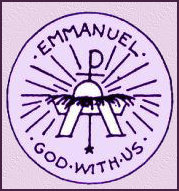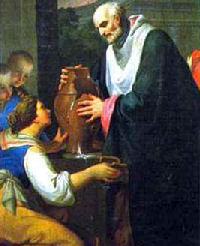Advent: December 23rd
Optional Memorial of St. John of Kanty, priest
Other Titles: John Cantius; John Kantius; Day 7 O Antiphons: O Emmanuel (O God Is With Us)
» Enjoy our Liturgical Seasons series of e-books!
Today the Church celebrates the optional memorial of St. John of Kanty, priest. Born in Kanty (Cracow, Poland), he taught at the university and became pastor of a parish. He was distinguished for his piety and love of neighbor.
We reach the culmination of the O Antiphons today. In previous antiphons our cry was directed to the Messiah as He manifested Himself to the Chosen People, to the Gentiles, and in nature; now He is addressed in person and asked to remain with us as Emmanuel.
Reading this final antiphon gives the feeling that a climax has indeed come. The very term Emmanuel, God with us, reveals the kindly, human heart of Jesus — He wants to be one of us, a Child of man, with all our human weakness and suffering; He wants to experience how hard it is to be man. He wants to remain with us to the end of time, He wants to dwell within us, He wants to make us share His nature.
O Emmanuel
"O Emmanuel (God with us), our King and Lawgiver, Thou expected one of the nations and their Redeemer, come and save us, O Lord our God."
Now we are about to receive the Savior, Emmanuel, God with us. God's only-begotten Son, born of the Father before all time, God of God, light of light, true God of true God, one being with the Father, is about to be born in time. For the salvation of men, He has come down upon earth and is conceived by the Holy Ghost in a virgin. He shall be called God with us, and yet He will be one in nature with us. He is to be like to us in all things except sin. He wills to share our poverty and to pray and suffer with us; He assumes our guilt. He is God with us in every phase of our life; He even takes our place on the cross, He remains with us in Holy Communion, in our daily Mass, and in our tabernacles. At some time in the future He will still be God with us in His beautiful heaven. All this He has done for us even though we have repeatedly turned our back on Him.
"Come and save us." The great God is with us. He has come, not to destroy the sinful world, as He once destroyed Sodom and Gomorrha, but to redeem it from its sins. This redemption is to be accomplished at the cost of great personal sacrifice to Him. As if this did not satisfy the burning ardor of His love, He wills to remain with us in our tabernacles. He incorporates us into Himself and shares His very life with us. We are engrafted in Him as a branch might be grafted to a new tree. "I am the vine, you are the branches" (John 15:5). God with us! We are united to Christ as a limb is united to a body, as a branch is united to a vine. We now belong to Christ and no longer to ourselves. We are one with Him. What a grace, what greatness, what nobility have been conferred upon us! God looking upon us no longer sees miserable specimens of mankind, but members of Christ. When He looks upon Christ, He sees Christ and us as united in one body, as a tree united to its branches. Even the smallest leaf fluttering on the farthest branch belongs to that tree and lives by the sap of that tree. Could He have redeemed us in a more perfect manner than by thus implanting in us and infusing in us His divine life? Let us reflect upon this seriously.
God with us! It was that He might be with us that He came that first Christmas at Bethlehem. He came that He might lift me up from the dust, and that I might share in His life. He will return this Christmas that He may continue and complete that work. It is for the same purpose that He comes in every Holy Mass and Communion, and in each inspiration and grace He gives us. His final coming will be for the same purpose, and will have the further aim of sharing with us His glorified life in heaven. We shall then enjoy the perfect vision of God, perfect love, and the fulfillment of all our desires for all eternity. For all eternity!
—Excerpted from The Light of the World by Benedict Baur, O.S.B.

7th O Antiphon: O Emmanuel (O God Is With Us)
Symbols:Manger
Come to save us, O Lord our God.
Traditional Antiphon: O Emmanuel, God with us, our King and Lawgiver, the expected of the nations and their Savior: Come to save us, O Lord our God.
O Emmanuel, Rex et legifer noster, expectatio gentium, et Salvator earum: veni ad salvandum nos, Domine, Deus noster.
Vespers Antiphon: O Emmanuel, king and lawgiver, desire of the nations, Savior of all people, come and set us free, Lord our God.
The manger reminds us of the simplicity and poverty surrounding the birth of Jesus and is representative of His life of humility.
Recommended Readings: Isaiah 9:2-7
St. John of Kanty
 John Cantius was born in the year 1397 in the Polish town of Kanty (whence his surname). He became a professor of theology, then parish priest; soon, however, he returned to the professor's chair at the University of Cracow. On foot he visited the holy places of Rome and Palestine. One day, after robbers had deprived him of all his effects, they asked him whether he had anything more. The saint said no, but hardly had they gone when he remembered having sewn some gold pieces inside his clothing; immediately he followed and overtook them. The robbers, astonished at the man's sense of truthfulness, refused to accept the money and returned to him the stolen luggage.
John Cantius was born in the year 1397 in the Polish town of Kanty (whence his surname). He became a professor of theology, then parish priest; soon, however, he returned to the professor's chair at the University of Cracow. On foot he visited the holy places of Rome and Palestine. One day, after robbers had deprived him of all his effects, they asked him whether he had anything more. The saint said no, but hardly had they gone when he remembered having sewn some gold pieces inside his clothing; immediately he followed and overtook them. The robbers, astonished at the man's sense of truthfulness, refused to accept the money and returned to him the stolen luggage.
To guard himself and his household from evil gossip he wrote upon the wall of his room (after the example of St. Augustine): Conturbare cave, non est placare suave, diffamare cave, nam revocare grave, i.e. "Guard against causing trouble and slandering others, for it is difficult to right the evil done." His love of neighbor was most edifying. Often he gave away his own clothing and shoes; then, not to appear barefoot, he lowered his cassock so as to have it drag along the ground. Sensing that his death was near at hand, he distributed whatever he still had to the poor and died peacefully in the Lord at an advanced age. He is honored as one of the principal patrons of Poland.
Patronage: Lithuania; Poland; diocese of Bielsko-Żywiec (since 1992); Jagiellonian University
Symbols and Representation: Dressed in a professor's gown with his arm around the shoulder of a young student whose gaze he directs towards heaven; giving his garments to the poor
Highlights and Things to Do:
- St. John's relics are found in University College of St. Ann in Cracow.
- Read more about St. John of Kanty:
- Since this day falls so close to Christmas, in imitation of St. John, we could do some acts of charity for the poor who will be suffering and alone during this holiday season. Contact your local council or St. Vincent de Paul organization in your parish to find out what families are needy. Make a food and gift basket to present to this family.
- Another good work would be taking the family to visit a nursing home. This time of year can often be depressing.
- Take some time to learn a little about Poland and its culture and traditions.
- Serve some Polish food, like pierogies and kielbasa (Polish sausage). You can try to make these from scratch, or find them ready-made in your grocery store.
- Visit online the St. John Cantius Church in Chicago, run by the Canons Regular of St. John Cantius. Read about their patron saint.
- Recite the Vespers hymn to St. John Kanty, O Glory of the Polish Race.
Today is Day Eight of the Christmas Novena.






